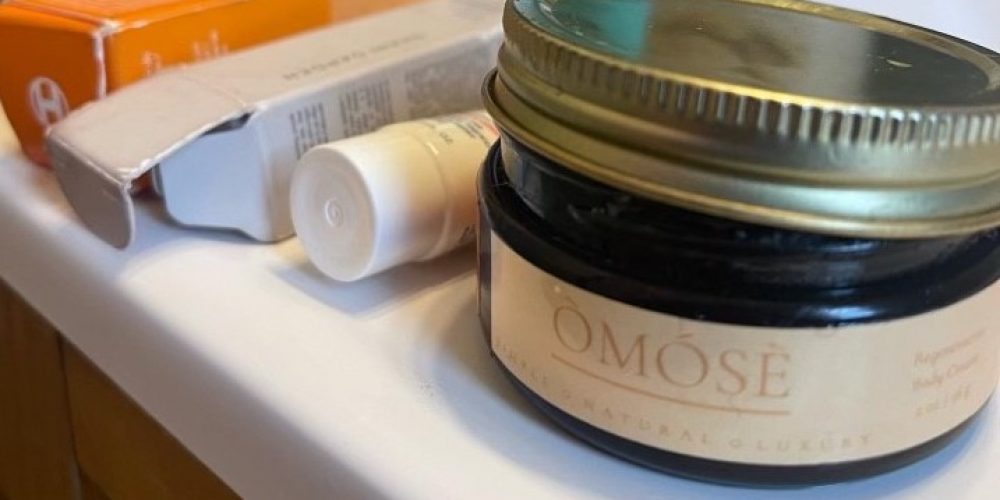When Osaiyekemwen (Ruth) Ogbemudia ’25 stepped onto Cornell’s campus her freshman year, she wasted no time getting involved with the university’s robust entrepreneurial ecosystem. In just two years, she has made the most of opportunities like the Black Entrepreneurs in Training (BET) program, W.E. Cornell, and the Epperson Entrepreneurship Fund to develop her skincare startup, ÒMÓSÈ. Not only has she grown her company, but along the way, she’s also gained confidence in her abilities and acquired insight for other aspiring young entrepreneurs.
ÒMÓSÈ is a skincare brand that makes regenerative creams to fade hyperpigmentation, scars, and stretch marks in all complexions, with a focus on celebrating underrepresented forms of beauty. The company is currently developing novel technology which will focus on minimizing waste and excess skincare product needs through reusable equipment that optimizes the skin’s barrier and biome.
Ogbemudia’s sister, Osariemen, thought of the idea for the company in 2017 as a beauty and self-care enthusiast, and the siblings began to seriously pursue ÒMÓSÈ together during the COVID-19 pandemic in 2020.
According to Ogbemudia, the goal of ÒMÓSÈ is to breathe Bini heritage into the beauty space and pass down to women the core tenets of self-love, self-esteem and self-care because self-preservation isn’t selfishness, despite many women being socialized to believe this to be the case. Ogbemudia said a desire to empower herself and her sister led to a love for the empowerment of women worldwide through the ritual of beauty.
“I was very interested in this idea because it relied a lot on family recipes and using stuff that we already used at home to heal our scars and to have more even, soft, and healthy skin,” Ogbemudia said. “We’re making money off of something that we were doing just in our daily lives, but also has the potential to be integrated into other people’s daily lives as a transformative instrument. People from all walks of life and gender will finally have a product that has efficacy but is also natural and has a good ethical background to it.”
When Ogbemudia first came to college, she felt uncertain about the future of ÒMÓSÈ, but she said Cornell’s variety of programs made entrepreneurship more approachable.
“If I don’t get something right, there’s always someone I can talk to,” she said. “That feeling of community and confidence is a really good breaking ground for some really good ideas to come to fruition.”
After attending a BET event within the first three weeks of her freshman year, she went on to join the 2022 W.E. Cornell cohort, which helps STEM innovators at Cornell hone their market fit and customer base.
Before conducting customer discovery, Ogbemudia thought customers would prefer products made for skin concerns on their faces, but she soon determined that that market was oversaturated. By speaking to potential customers about their desires, Ogbemudia learned that a greater need existed for products addressing hyperpigmentation on the rest of the body.
“Taking assumptions, getting the data, and also being able to parse it properly in terms of using a more fruitful market is something that really helped us in terms of iterative customer discovery,” she said.
The summer after W.E. Cornell, Ogbemudia received funding for her startup through the Epperson Entrepreneurship Fund, which she mainly used to source the products’ components. ÒMÓSÈ ethically sources ingredients such as aloe vera, Nilotica shea butter from a women’s co-op in Uganda, and moringa plant from farms in Ghana. She also put the funding toward further customer discovery, advertising, and planning.
For now, Ogbemudia, who studies biomedical engineering, is focused on school, but she plans to continue scaling up her business with her sister in the future. Given the success of their first products, they’re considering pivoting to a more technological lens and applying their formula to new areas, such as scar-minimizing post-op bandages.
Ogbemudia advises anyone interested in pursuing entrepreneurship to talk to people with experience and expertise, develop confidence, and know that while entrepreneurship can seem unapproachable, it is possible to successfully start a company.
“I feel like anyone could be an entrepreneur, as long as you learn the skills of the trade and you’re willing to accept that things may not be perfect all the time,” she said. “Accept that through this experience, good or bad, you learn skills that are applicable beyond entrepreneurship. This taught me a lot of discipline, priorities, and balance, which I’ll now be able to apply to other things in my life.”






